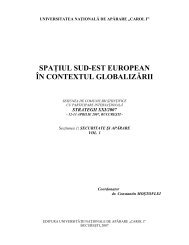Impact strategic nr.6-7 - Centrul de Studii Strategice de Apărare şi ...
Impact strategic nr.6-7 - Centrul de Studii Strategice de Apărare şi ...
Impact strategic nr.6-7 - Centrul de Studii Strategice de Apărare şi ...
- No tags were found...
Create successful ePaper yourself
Turn your PDF publications into a flip-book with our unique Google optimized e-Paper software.
SECURITATE ŞI STRATEGIE MILITARĂ<br />
naţiunii.<br />
Nu cre<strong>de</strong>m că mai are sens să mai încercăm, în materialul<br />
<strong>de</strong> faţă, o <strong>de</strong>monstraţie a faptului că, în condiţiile<br />
începutului mileniului III <strong>şi</strong> ale globalizării, o <strong>de</strong>zvoltare<br />
autarhică, <strong>de</strong> înalt nivel tehnologic, este o iluzie.<br />
Totu<strong>şi</strong>, vom insista, în continuare, mai ales asupra<br />
problematicii implementării sistemului <strong>de</strong> valori europene<br />
<strong>şi</strong> euro-atlantice.<br />
Sistemul <strong>de</strong> valori europene <strong>şi</strong> euro-atlantice (<strong>de</strong>mocraţia,<br />
libertăţile <strong>şi</strong> drepturile omului, statul <strong>de</strong> drept,<br />
proprietatea privată, cooperarea, armonizarea <strong>de</strong> interese<br />
etc.) este un element <strong>de</strong> bază care oferă unitate <strong>şi</strong> coeziune<br />
tuturor structurilor economice, sociale, politice <strong>şi</strong><br />
militare din Occi<strong>de</strong>nt. Acest sistem <strong>de</strong> valori <strong>şi</strong>-a dovedit<br />
superioritatea în <strong>de</strong>ceniile Războiului Rece <strong>şi</strong> a constituit,<br />
pentru popoarele din „statele captive”, o aspiraţie vitală.<br />
Implementarea acestui sistem <strong>de</strong> valori, nu adoptarea lui<br />
formală, poate oferi României <strong>şi</strong> întregii Europe <strong>de</strong> Est<br />
instrumentul cel mai eficient <strong>de</strong> relansare a vieţii sociale,<br />
a economiei, a spiritului public ş.a.m.d. Adoptarea funcţională<br />
a sistemului occi<strong>de</strong>ntal <strong>de</strong> valori poate fi înlesnită,<br />
în România, ca <strong>şi</strong> în alte state europene, <strong>de</strong> existenţa unei<br />
tradiţii a mo<strong>de</strong>rnităţii <strong>de</strong> tip occi<strong>de</strong>ntal (datând din secolele<br />
XVIII-XIX). Această tradiţie a fost întreruptă dramatic <strong>de</strong><br />
ocuparea sovietică <strong>şi</strong> <strong>de</strong> comunism <strong>şi</strong> combătută în diferite<br />
forme, după 1989, <strong>de</strong> către diverse categorii <strong>de</strong> „nostalgici”,<br />
structuri birocratice, grupări „oculte” <strong>de</strong> interese.<br />
Perioada <strong>de</strong> după 1989 a pus în faţa societăţii româneşti<br />
problema re<strong>de</strong>finirii <strong>şi</strong> reformulării intereselor naţionale <strong>şi</strong><br />
a obiectivelor fundamentale ale naţiunii <strong>şi</strong> ale statului. La<br />
nivelul factorilor politici, remarcăm faptul că cele mai importante<br />
grupări, parti<strong>de</strong>, forţe din ţara noastră s-au aşezat<br />
pe poziţii i<strong>de</strong>ntice sau aproape i<strong>de</strong>ntice în raport cu obiectivele<br />
integrării euro-atlantice. Aceste obiective s-au bucurat<br />
permanent <strong>de</strong> un larg suport popular, chiar dacă opinia<br />
publică nu a înţeles întot<strong>de</strong>auna conţinutul programelor<br />
<strong>de</strong> a<strong>de</strong>rare la NATO sau costurile politicii <strong>de</strong> integrare în<br />
UE. Factorii politici au operat, <strong>de</strong>ci, în formularea acestor<br />
obiective cu ceea ce se numeşte „raţiune <strong>de</strong> stat”, în timp<br />
ce populaţia a acţionat sub un puternic impuls emoţional,<br />
sperând că integrarea în structurile euro-atlantice va fi un<br />
panaceu împotriva racilelor, nedreptăţilor <strong>şi</strong> inegalităţilor<br />
societăţii româneşti. De aceea, clasa politică are o mare<br />
responsabilitate în următorii ani în domeniul gestionării<br />
corecte <strong>şi</strong> eficiente a procedurilor <strong>de</strong> integrare în structurile<br />
euro-atlantice, <strong>de</strong> capacitatea sa concretă <strong>de</strong> a gestiona<br />
aceste procese <strong>de</strong>pinzând, în mare măsură, în<strong>de</strong>plinirea<br />
efectivă a obiectivelor prioritare <strong>de</strong> pe agenda <strong>de</strong>zvoltării<br />
naţionale (economică, politică, socială, culturală etc.).<br />
BIBLIOGRAFIE<br />
– Strategia <strong>de</strong> securitate naţională a României<br />
– Securitatea naţională la început <strong>de</strong> secol XXI, AÎSM, Bucureşti, 2001.<br />
The national interest is the general expression of the vital necessities of a state, which are <strong>de</strong>riving from the existence of a national<br />
state itself and its sovereignty statute. Usually, the components of the national interest are: interests regarding physical survival of the<br />
state, the national security, the state rights and its international prestige/role/statute, the economical and social prosperity/<strong>de</strong>velopment,<br />
the political stability and political regime/system.<br />
A difficult problem of the contemporary era consists in the impact of the globalization and regionalization over national interests.<br />
Moreover, there is a direct and obvious relation between national interests, national states and national i<strong>de</strong>ntities.<br />
In present, at least at the great international actors level, there is a space for dialog, interests harmonization and partnerships, hard<br />
to anticipate even at the beginning of ’80s.<br />
The harmonization of the interests has become, in the past years, the solution for avoiding consi<strong>de</strong>rable conflicts in the international<br />
life, and it is a method by which the members of the international community can bring into accord the fundamental interests with the<br />
present realities.<br />
In the aca<strong>de</strong>mic society, and not only there, has been <strong>de</strong>bated the problem of the relations between the individual interests, nation<br />
interests and state interests.<br />
Romania’s fundamental interests are established by the political factor and they have a dynamic character <strong>de</strong>termined by the transformations<br />
on internal and external plan.<br />
Romanian state is promoting its national interests by security policy. It’s an integrated part of the general policy and inclu<strong>de</strong>s principles,<br />
norms, measures and actions un<strong>de</strong>rtaken in all domains, organizations and institutions established to promote and protect fundamental<br />
interests.<br />
Romania’s joining NATO – the fundamental objective of the “national interest” policy, after 1989 – is an absolute necessarily guarantee<br />
of security in the present international context of reshaping world or<strong>de</strong>r, revival of the nationalistic passions, interethnic and interconfessional<br />
conflicts, increased terrorist threats and NBC proliferation. Meantime, the political-military relations between Romania and NATO<br />
imply a Romanian security contribution to the Alliance, expressed through a set of roles, responsibilities and specific missions.<br />
Romania’s adhesion to NATO cannot be separated from the integration process to EU. In both cases, a radical economic and institutional<br />
transformation is necessary, mainly the implementation of a set of truly mo<strong>de</strong>rn values (<strong>de</strong>mocracy, human rights and freedom, fair state,<br />
private property, cooperation, harmonization of interests etc.). For that, the political class has a future great responsibility in the domain<br />
of right and efficient management of integration procedures to Euro-Atlantic structures; on its concrete capacity to manage these processes<br />
<strong>de</strong><br />
IMPACT STRATEGIC nr. 1-2/2003<br />
97



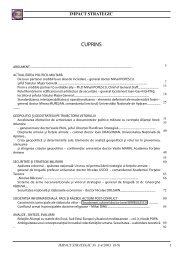

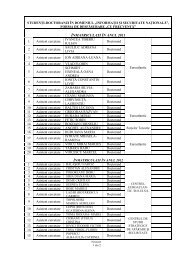
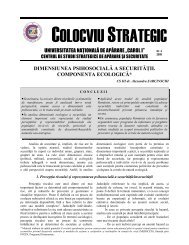
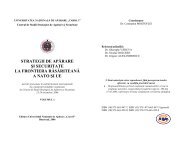
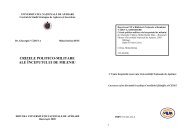


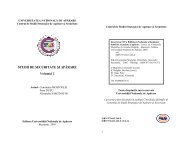
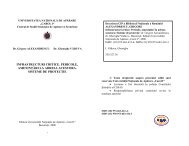
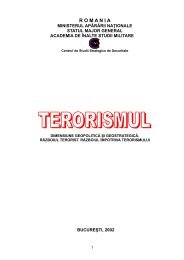
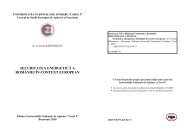
![„CAROL Nr 4 [29]/2008](https://img.yumpu.com/53801719/1/184x260/carol-nr-4-29-2008.jpg?quality=85)
